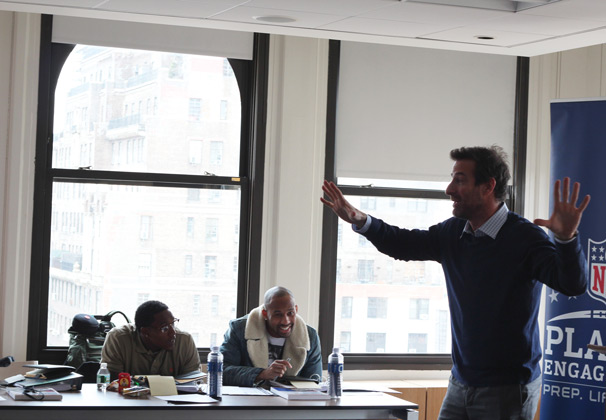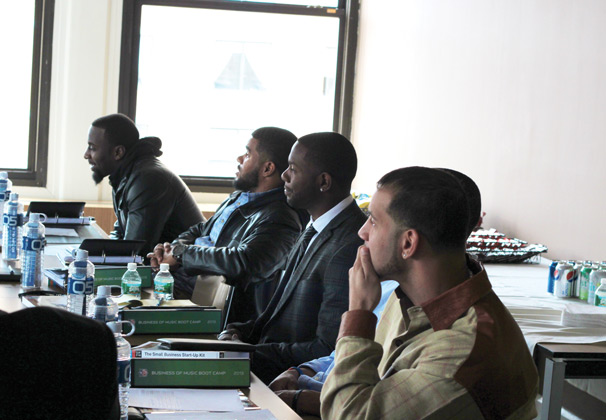
Post-professional life for a football player is undeniably tricky. For people who have devoted their entire lives to athletics, the end of a career may mean a jarring departure from an already unusual lifestyle. Thus, the four-day boot camp at the Clive Davis Institute of Recorded Music served, in part, as a way for football stars to pursue options for life after football. Samantha Kleinman, manager of NFL Player Engagement, said a program such as the Clive Davis Institute’s boot camp “exists to help athletes transition to new career options.”
While listening to music industry professionals, the players took fervent notes, asked questions and listened with enthusiasm to the array of illustrious guest speakers, from Run-D.M.C.’s Darryl McDaniels to guitar legend Robert Randolph.
“The Business of Music Boot Camp provides our current and former players with an exciting opportunity to gain an understanding about potential music careers while meeting key leaders in the business,” said Dan Masonson, the director of corporate communications for the NFL. “Working with NYU’s Clive Davis Institute … offers a tremendous learning experience and exposure to the best of the best in the field.”
Adam Farrell and Jake Friedman, music distributors who work with prominent independent artists, said record labels were once necessary for distribution, but now they have almost been rendered obsolete with the growth of the Internet. Anyone can record, distribute and promote music through Tumblr, Twitter, music software like GarageBand and media-sharing websites.
Clive Davis chairman and well-known manager Jeffrey Rabhan discussed what he calls “viral” artists — musicians who gain an extraordinary amount of popularity in a short amount of time due to online word of mouth — and said diligent work should be the priority for NFL players interested in the business.
“A phenomenon can’t be your marketing plan,” Rabhan said.
Farrell, the vice president of the Beggars Group, recalled the way his label first took notice of successful rapper Tyler, The Creator. He first noticed Tyler and his crew at the Supreme store in Los Angeles. Tyler impressed Farrell when Chris Brown walked into the store. He and his crew began publicly taunting Brown, attracting Farrell’s attention. Farrell’s example implicitly reveals the daunting truth for those trying to make it in the Internet age: to get noticed, you need to have more to bring to the table than just a nice voice.
Nate Palmer, a wide receiver for the Indianapolis Colts, said a NFL back-story could be a hindrance to breaking into the music industry.
“People might not take us seriously and think [we] should stick to football,” Palmer said.
Quintin Demps, formerly of the Houston Texans, wasn’t as wary of the potential criticism that comes with a music career, given the scrutiny that comes with playing a nationally televised sport.
“You’re always critiqued,” Demps said. “You have to have thick skin.”
Indeed, much of the advice given to the attendees of the boot camp amounted to one adage: know thyself.
In the age of the internet, praise and criticism can touch anyone, even the seemingly invincible football star. However, the internet acts as a mighty equalizer, making it possible for anyone from a suburban kid to a famous athlete to become a music star. The advice given to the titans of the NFL rings true for anyone hoping to break into the music industry: work hard, be true to yourself and hope for a bit of luck to come your way.
A version of this article was published in the Monday, March 25 print edition. Jake Folsom is a contributing writer. Email him at [email protected].























































































































































